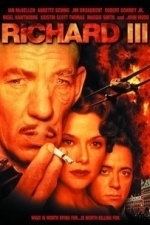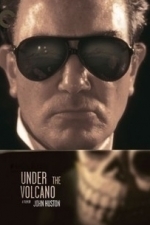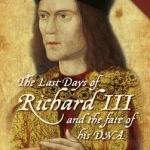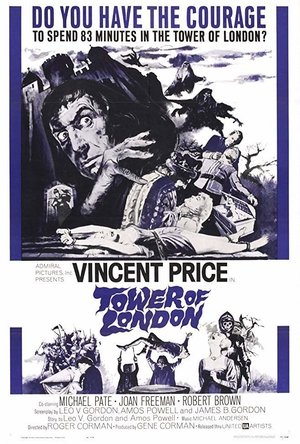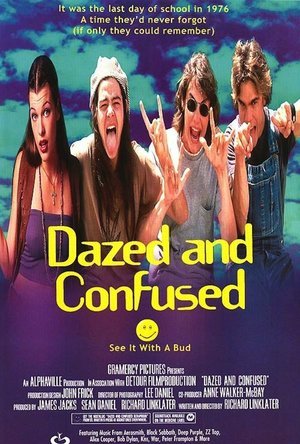Search
Search results
Paul Morrissey recommended Richard III (1995) in Movies (curated)
Paul Morrissey recommended Under the Volcano (1984) in Movies (curated)
This is only a fairly short book with a limited focus, but nevertheless I found it very interesting. It's odd really, because opinion on the subject tends to be so polarised that it's easy to lose sight of a few simple facts and some of what Ashdown-Hill presents here should really be so obvious! For starters, for all the association of Bosworth with Richard III he didn't know it was going to happen and obviously didn't go in 'knowing' that he was going to be defeated - hindsight may be a great thing, but not if you want to look at historical events in context!
The Portuguese marriage proposals was something that I did know about, but here it's presented so logically it makes absolute sense. The chosen bride was a princes of Portugal, with a Spanish Infanta also in the playing as a reserve option. Both of these princesses were descended from the legitimate and senior branch of the House of Lancaster! Furthermore, it seems that a Portuguese marriage was also in the offing for Elizabeth of York. That being so, the letter supposedly written by her (reported by Buck, but now seemingly lost) makes more sense as does the confusion over Richard II wanting to marry Elizabeth, his niece, which never made any real sort of sense as, if we accept the truth of the Eleanor Butler pre-contract, then the children of Edward IV by Elizabeth Woodville were undoubtedly illegitimate, so there would be absolutely no point in Richard marrying her. On the other hand, Elizabeth and her sisters were the closest things available to Royal Princesses to be traded on the dynastic marriage market.
The Portuguese marriage proposals was something that I did know about, but here it's presented so logically it makes absolute sense. The chosen bride was a princes of Portugal, with a Spanish Infanta also in the playing as a reserve option. Both of these princesses were descended from the legitimate and senior branch of the House of Lancaster! Furthermore, it seems that a Portuguese marriage was also in the offing for Elizabeth of York. That being so, the letter supposedly written by her (reported by Buck, but now seemingly lost) makes more sense as does the confusion over Richard II wanting to marry Elizabeth, his niece, which never made any real sort of sense as, if we accept the truth of the Eleanor Butler pre-contract, then the children of Edward IV by Elizabeth Woodville were undoubtedly illegitimate, so there would be absolutely no point in Richard marrying her. On the other hand, Elizabeth and her sisters were the closest things available to Royal Princesses to be traded on the dynastic marriage market.
Deborah (162 KP) rated The Princes in the Tower in Books
Dec 21, 2018
Wilkinson admits that in writing the second part of her biography of Richard III, she became too bogged down with the whole 'princes in the tower' enigma and so chose to pull some of her thoughts together in this book.
Each chapter looks at a different suspect of aspect of the mystery. I've given only three stars not because there was anything particularly wrong with what was written, I think I just expected that Wilkinson had uncovered something new or had a stunning new theory to present! The downside with reading non-fiction books on the Kindle can be that you get to about 75% in and it suddenly ends with the rest of the book being footnotes, bibliography etc.
It is a good and lucid look at the facts and the arguments, so not a bad book, just nothing new and didn't meet the expectations I had formed.
Each chapter looks at a different suspect of aspect of the mystery. I've given only three stars not because there was anything particularly wrong with what was written, I think I just expected that Wilkinson had uncovered something new or had a stunning new theory to present! The downside with reading non-fiction books on the Kindle can be that you get to about 75% in and it suddenly ends with the rest of the book being footnotes, bibliography etc.
It is a good and lucid look at the facts and the arguments, so not a bad book, just nothing new and didn't meet the expectations I had formed.
Deborah (162 KP) rated The Mythology of Richard III in Books
Dec 21, 2018
As usual, Ashdown-Hill has given us a well-written and accessible book with an extensive index and bibliography and reasoning well backed up with factual evidence; I find his books are always worth reading an a refreshing change from a lot of the nonsense there is out there. In this particular book he looks at myths and legends, both old and rather worryingly modern, that surround one or our best known monarchs.
Early chapters deal with the mythology perpetuated by Tudor propagandists and blinkered 'traditionalists' despite lack of evidence in many cases and even explicit evidence to the contrary in others! He looks at how some stories, such as the 'body in the river' became perpetuated over time so that they eventually become accepted as 'truth' by the uninformed. Even I had taken rather at face value the story of the White/Blue Boar Inn, but as Ashdown-Hill points out, it would be much more logical for Richard III to have stayed at Leicester Castle, as he had on a previous occasion, and also there is no evidence that an inn with a boar in its name existed at all in Leicester at this time!
The latter part of the book deals with more modern myths and I was really rather saddened and disappointed that it was necessary to have to set the record straight on many aspect of the rediscovery of the king's grave. I completely understand Ashdown-Hill's need to do so. After reading his earlier book 'The Last Days of Richard III' I was thoroughly convinced by his well reasoned arguments and never for a moment did I seriously doubt that that is where Richard III's resting place was. I was almost ready to go and dig the car park up myself! Whatever the rights and wrongs of it, I did find all the arguments over a final resting place to be somewhat distasteful, with some people sinking very low in voicing their opinions. It is disheartening that a British University PR department is less interested in truth than in trying to keep all the kudos for itself and I hope that people will read this and know the truth. With all its apparent misinformation I doubt I will be bothering with the visitor centre in Leicester any more than I have bothered to visit the putative site of Bosworth.
Early chapters deal with the mythology perpetuated by Tudor propagandists and blinkered 'traditionalists' despite lack of evidence in many cases and even explicit evidence to the contrary in others! He looks at how some stories, such as the 'body in the river' became perpetuated over time so that they eventually become accepted as 'truth' by the uninformed. Even I had taken rather at face value the story of the White/Blue Boar Inn, but as Ashdown-Hill points out, it would be much more logical for Richard III to have stayed at Leicester Castle, as he had on a previous occasion, and also there is no evidence that an inn with a boar in its name existed at all in Leicester at this time!
The latter part of the book deals with more modern myths and I was really rather saddened and disappointed that it was necessary to have to set the record straight on many aspect of the rediscovery of the king's grave. I completely understand Ashdown-Hill's need to do so. After reading his earlier book 'The Last Days of Richard III' I was thoroughly convinced by his well reasoned arguments and never for a moment did I seriously doubt that that is where Richard III's resting place was. I was almost ready to go and dig the car park up myself! Whatever the rights and wrongs of it, I did find all the arguments over a final resting place to be somewhat distasteful, with some people sinking very low in voicing their opinions. It is disheartening that a British University PR department is less interested in truth than in trying to keep all the kudos for itself and I hope that people will read this and know the truth. With all its apparent misinformation I doubt I will be bothering with the visitor centre in Leicester any more than I have bothered to visit the putative site of Bosworth.
Matthew Krueger (10051 KP) rated Tower of London (1962) in Movies
Dec 20, 2020
Haunted Memories
Did you know that Vincent Price appeared in the 1939 version of "Tower of London" with Boris Karloff and Basil Rathbone. I thought that was intresting. Anyways this version adds the horror element to it mixed with historical drama and it does a good job. The drama added with the horror combines well.
The plot: In 15th-century England, Richard III (Vincent Price) desperately wants the throne, but his ailing brother, King Edward IV (Justice Watson), instead bestows it upon his other sibling, Clarence (Richard McCauly). This sends Richard into a homicidal rage, resulting in Clarence's murder and the deaths and torture of many others who could keep the crown from the crazed man. But as the mayhem continues, Richard's sanity slips, and the ghosts of the murdered men begin to haunt the beleaguered royal.
Aside from the historical setting, the movie is not connected to the 1939 film of the same name, starring Price, Basil Rathbone and Boris Karloff.
The movie was meant to be the first of a three-picture contract between Corman and Small. Corman later called the movie:
"The most foolish thing I’ve ever filmed. Every night he [Small] would come to see me or call me. The script was changed, reworked without my consent. Lots of strange things were happening all the time, and finally I asked him to tear up our contract. He realized he wouldn’t get anything worthwhile out of me and tore it up. I have nothing against Eddie Small. He’s an old man who had lots of success during the thirties, and who doesn’t know that times have changed".
I thought it was a really good film.
The plot: In 15th-century England, Richard III (Vincent Price) desperately wants the throne, but his ailing brother, King Edward IV (Justice Watson), instead bestows it upon his other sibling, Clarence (Richard McCauly). This sends Richard into a homicidal rage, resulting in Clarence's murder and the deaths and torture of many others who could keep the crown from the crazed man. But as the mayhem continues, Richard's sanity slips, and the ghosts of the murdered men begin to haunt the beleaguered royal.
Aside from the historical setting, the movie is not connected to the 1939 film of the same name, starring Price, Basil Rathbone and Boris Karloff.
The movie was meant to be the first of a three-picture contract between Corman and Small. Corman later called the movie:
"The most foolish thing I’ve ever filmed. Every night he [Small] would come to see me or call me. The script was changed, reworked without my consent. Lots of strange things were happening all the time, and finally I asked him to tear up our contract. He realized he wouldn’t get anything worthwhile out of me and tore it up. I have nothing against Eddie Small. He’s an old man who had lots of success during the thirties, and who doesn’t know that times have changed".
I thought it was a really good film.
Deborah (162 KP) rated The Third Plantagenet: George, Duke of Clarence, Richard III's Brother in Books
Dec 21, 2018
John Ashdown-Hill really has the ability to write clearly and compellingly. This latest offering takes a look at the middle of the brothers of York, George, Duke of Clarence.
Much less well known than his more famous brothers, Edward IV and Richard III, nonetheless, Clarence and his life and death were am important part of the story of this period. His supposed death by drowning in a butt of Malmsey wine is one of those well known 'facts' that might be a mythology all of its own, but Ashdown-Hill provides evidence to suggest that drowning was used as a method of execution in this period and considered kinder than hanging or beheading!
It's not a long book and a good proportion is given over to a study of the Clarence vault at Tewksbury abbey and the remains therein. If you are interested in the period, this is certainly worth a read. I look forward to the forthcoming companion volume, The Dublin King.
Much less well known than his more famous brothers, Edward IV and Richard III, nonetheless, Clarence and his life and death were am important part of the story of this period. His supposed death by drowning in a butt of Malmsey wine is one of those well known 'facts' that might be a mythology all of its own, but Ashdown-Hill provides evidence to suggest that drowning was used as a method of execution in this period and considered kinder than hanging or beheading!
It's not a long book and a good proportion is given over to a study of the Clarence vault at Tewksbury abbey and the remains therein. If you are interested in the period, this is certainly worth a read. I look forward to the forthcoming companion volume, The Dublin King.
Deborah (162 KP) rated Bosworth Field and the Wars of the Roses in Books
Dec 21, 2018
For starters, the book is entitled Bosworth Field & the Wars of the Roses. Discussion of Bosworth is pretty much restricted to one short chapter and about the first third of the book is taken up with an over-detailed account of the events leading up to the Wars of the Roses; if Rowse is concerned about 'Wars of the Roses' being a misnomer, perhaps he should look to his own title! Yes, the events from the disposition of Richard II in 1399 and the usurpation of his throne by Bolingbroke do have an impact on later events, but a third of the book? Do we really need to know the ins and outs of Sir John Oldcastle's Lollard leanings - I fail to see how this is relevant.
Rowse's chapter on Shakespeare must be at least as long, if not longer, than his chapter on Bosworth. The fact that he obviously sincerely believes that one can gain a credible understanding of history from Shakespeare cycle of plays was almost enough to make me drop the book in astonishment! How can one take him seriously?!
He is also ready to give every credit to the supposed work of More. Even here he falls down by claiming that the bodies of the 'princes in the tower' were discovered in the exact place More said! If you read this work you'll find that the opposite is true - they are in the exact place More said they were NOT! The fact that there isn't a shred of evidence that anyone killed the two princes is evidently a small matter to Rowse. He mentions the great turncoat, Sir William Stanley (at this point step-uncle to Henry Tudor) being executed s a result of the Perkin Warbeck debacle, but fails to mention that Sir William is imputed to have said that if Warbeck really was Richard of York, he would not fight against him. Of course he doesn't mention this - he has to keep reminding us that EVERYONE believed Richard III guilty! Really, a credible historian should not pick and choose their facts - something Alison Weir is also very fond of doing.
Another point is that he is quite happy to accept that Katherine of Valois really did marry Owen Tudor, but cannot countenance the much more credible suggestion that Edward IV was married to Eleanor Butler (nee Talbot), who is not even mentioned. He harps on about the morality and piety of the Lancastrians (despite the Beauforts being conceived in double adultery - further hypocrisy) but when Richard III founds a chantry or offers some concession to a religious house that Rowse concludes it much be down to his uneasy concience.
So, overall, not a book I can recommend in the least. He may try to convince us that his unbending traditionalist view is 'sensible' and 'common sense' but anyone with a little knowledge of the subject will see it as laughably absurd and highly prejudiced.
Rowse's chapter on Shakespeare must be at least as long, if not longer, than his chapter on Bosworth. The fact that he obviously sincerely believes that one can gain a credible understanding of history from Shakespeare cycle of plays was almost enough to make me drop the book in astonishment! How can one take him seriously?!
He is also ready to give every credit to the supposed work of More. Even here he falls down by claiming that the bodies of the 'princes in the tower' were discovered in the exact place More said! If you read this work you'll find that the opposite is true - they are in the exact place More said they were NOT! The fact that there isn't a shred of evidence that anyone killed the two princes is evidently a small matter to Rowse. He mentions the great turncoat, Sir William Stanley (at this point step-uncle to Henry Tudor) being executed s a result of the Perkin Warbeck debacle, but fails to mention that Sir William is imputed to have said that if Warbeck really was Richard of York, he would not fight against him. Of course he doesn't mention this - he has to keep reminding us that EVERYONE believed Richard III guilty! Really, a credible historian should not pick and choose their facts - something Alison Weir is also very fond of doing.
Another point is that he is quite happy to accept that Katherine of Valois really did marry Owen Tudor, but cannot countenance the much more credible suggestion that Edward IV was married to Eleanor Butler (nee Talbot), who is not even mentioned. He harps on about the morality and piety of the Lancastrians (despite the Beauforts being conceived in double adultery - further hypocrisy) but when Richard III founds a chantry or offers some concession to a religious house that Rowse concludes it much be down to his uneasy concience.
So, overall, not a book I can recommend in the least. He may try to convince us that his unbending traditionalist view is 'sensible' and 'common sense' but anyone with a little knowledge of the subject will see it as laughably absurd and highly prejudiced.
Deborah (162 KP) rated Fatal Colours in Books
Dec 21, 2018
Overall I thought this was a good book written in a very readable style. I've only given it 3 stars, however, as it does fall down in a number of ways.
First and foremost, the title of the book is a bit misleading. The Battle of Towton itself accounts for probably no more than a quarter of the text. I'm not saying the the rest of the book is bad, because it deals with the whole 'first half' of the Wars of the Roses and looks at how Henry VI's incapacity to rule (and the reasons for this) where in some degree responsible for the conflict, but it might be disappointing if you were expecting a full on coverage of Towton. You could try Andrew Boardman's book instead if you were interested in the battle.
My second disappointment was the introduction. Why would you ask Starkey, a well known Tudor historian, with a typical Tudor historian rabid anti-Yorkist views to write an introduction to a book ostensibly about one of the great Yorkist victories? This was one reason I held off buying this book for quite some time, not helped by the fact that the Kindle download sample was just part of this introduction, which wasn't helpful at all.
Goodwin delivered his own Coup de Grace in my eyes right at the end where he almost offhandedly accused Richard III of both the murder of his nephews (hotly debated, I admit, but without a shred of solid evidence) and then saying he 'probably' murdered Henry VI!!! Unless you take Shakespeare as gospel, there is absolutely no evidence at all for this and it's most unlikely. These couple of throwaway comments severely undermined Goodwin's credibility, which was a shame, as I felt that the book overall was good, but it makes me wonder if there was other sloppy research in there?
First and foremost, the title of the book is a bit misleading. The Battle of Towton itself accounts for probably no more than a quarter of the text. I'm not saying the the rest of the book is bad, because it deals with the whole 'first half' of the Wars of the Roses and looks at how Henry VI's incapacity to rule (and the reasons for this) where in some degree responsible for the conflict, but it might be disappointing if you were expecting a full on coverage of Towton. You could try Andrew Boardman's book instead if you were interested in the battle.
My second disappointment was the introduction. Why would you ask Starkey, a well known Tudor historian, with a typical Tudor historian rabid anti-Yorkist views to write an introduction to a book ostensibly about one of the great Yorkist victories? This was one reason I held off buying this book for quite some time, not helped by the fact that the Kindle download sample was just part of this introduction, which wasn't helpful at all.
Goodwin delivered his own Coup de Grace in my eyes right at the end where he almost offhandedly accused Richard III of both the murder of his nephews (hotly debated, I admit, but without a shred of solid evidence) and then saying he 'probably' murdered Henry VI!!! Unless you take Shakespeare as gospel, there is absolutely no evidence at all for this and it's most unlikely. These couple of throwaway comments severely undermined Goodwin's credibility, which was a shame, as I felt that the book overall was good, but it makes me wonder if there was other sloppy research in there?
